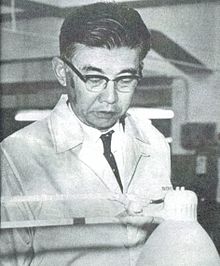Ibuka Masaru
Ibuka Masaru ( Japanese 井深 大; born April 11, 1908 in Nikkō ; † December 19, 1997 in Tōkyō ) was a Japanese entrepreneur. He co-founded the company that became Sony .
Life
Ibuka Masaru received his PhD from Waseda University in 1933 , where he was nicknamed "Captain America". After graduation, he worked in a photo lab that developed motion pictures. In 1945 he left the company and opened a radio repair shop in Tokyo.
In 1946 Ibuka and Morita Akio founded the Sony Corporation , which operated until 1958 as "Tōkyō Telecommunications Engineering Corporation" (東京 通信 工, Tōkyō tsūshin kōgyō). Ibuka was instrumental in ensuring that Sony was able to secure the license rights to the transistor technology of Bell Laboratories in the 1950s . This made Sony one of the first companies to use this technology for civil purposes. From 1950 to 1971 Ibuka was President of Sony and from 1971 to 1976 he was Chairman of the Board of Directors.
Ibuka left Sony in 1976. He remained closely associated with the company as a consultant until he died in 1997 of heart failure.
writing
Ibuka was the author of the book Kindergarten is too late (幼稚園 で は 遅 す ぎ る, Yōchien dewa osugiru; 1971), in which he argued that people learn the most between the ages of 9 months and 3 years and showed ways and possibilities to promote this. The foreword to the book was written by the American Glenn Doman (1919-2013). He was the founder of the Institute for the Achievement of Human Potential , an organization that trained parents on the development of the child's brain. Ibuka and Doman agreed that the first years of life were crucial for education.
Awards and honors
- 1960 Medal of Honor with a blue ribbon from the Emperor of Japan
- 1964 Award for outstanding performance from the Institute of Japanese Communication Engineers
- 1972 Founder Medal of the IEEE ( Institute of Electrical and Electronics Engineers )
- 1976 Honorary Doctor of Engineering, Sophia University , Tokyo
- 1978 Order of the Holy Treasure, 1st class.
- 1979 Honorary Doctor of Science, Waseda University , Tokyo
- 1981 Humanism and Technology Award from the Aspen Institute for Humanistic Studies
- 1986 Great Order of the Rising Sun on the ribbon.
- 1986 Commander first class of the North Star Order .
- 1986 Eduard Rhein Ring of Honor from the Eduard Rhein Foundation
- 1989 appointment to Bunka Kōrōsha, person with special cultural merit
- 1990 The IEEE Masaru Ibuka Consumer Electronics Award was named after him [1]
- 1991 Bronze Wolf of the World Organization of the Scout Movement
- 1992 Order of Culture
- 1992 The Masaru Ibuka Memorial Hall (井深 大 記念 ホ ー ル) was built on the grounds of Waseda University (Building 18).
- 1993 honorary citizen of Tokyo
- 1994 Honorary Doctor of Science, Brown University (USA)
Web links
Individual evidence
- ↑ a b c d Kirkup, James. "Obituary: Masaru Ibuka," Independent (London). December 22, 1997.
- ^ Antiquarian books site
- ↑ Waseda University campus map
| personal data | |
|---|---|
| SURNAME | Ibuka, Masaru |
| ALTERNATIVE NAMES | 井深 大 (Japanese) |
| BRIEF DESCRIPTION | Japanese entrepreneur |
| DATE OF BIRTH | April 11, 1908 |
| PLACE OF BIRTH | Nikko |
| DATE OF DEATH | December 19, 1997 |
| PLACE OF DEATH | Tokyo |
